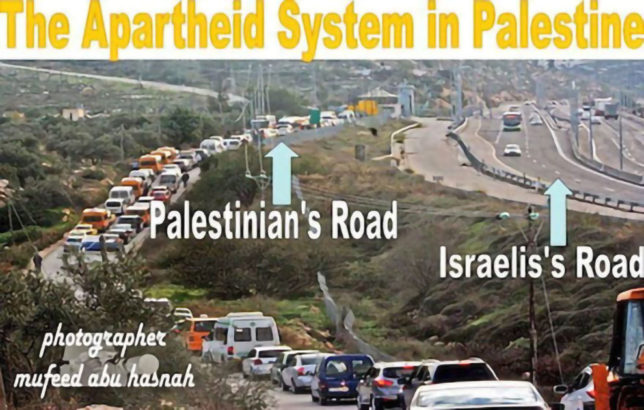
Two roads in Israel: a rocky, dirt road for Palestinians, and a wide superhighway for Israelis. (Different colored license tags designate who’s allowed on a road, and who’s excluded.)
Many Jewish groups in America are sending mixed signals: YES, we want equality for Black Americans; NO, we do not want the same for Palestinians… and we’re using our power to procure U.S. policies that support Israel despite its systemic discrimination and violence.
by Kathryn Shihadah
In the wake of George Floyd’s death and the protest movement that followed, thousands of organizations have taken to social media, expressing their support for Black lives and the right to protest injustice. Among those jumping on the bandwagon were 130 Jewish organizations, 800 rabbis, and the American Israel Public Affairs Committee (AIPAC).
But talk is cheap. Several Israeli and Jewish human rights groups have called out AIPAC and others for their duplicity.
+972 Mag – an independent, nonprofit website run by Israeli and Palestinian journalists – recently posted an article entitled, “U.S. Jews are standing up for Black lives. Why aren’t we doing so for Palestinians?” The article boldly declared,
[T]here is a glaring problem with the way many mainstream American Jewish organizations are responding to this critical moment: they have not applied the same values-based approach to Palestinian rights and Israeli state violence as they do to U.S. police violence. Because of this inconsistency, the responses of many Jewish groups to the current events in the United States seem hollow at best, and self-serving at worst…
For many, this dissonance makes it harder to take Jewish commitments to racial justice in the U.S. seriously, while the same groups strenuously work to uphold similar systems of oppression in Palestine-Israel.
It is essential that we speak out with equal zeal and righteous indignation against Israeli state violence and for justice for Palestinians.
IfNotNow, a Jewish organization that supports many (but not all) Palestinian rights, chided AIPAC for claiming solidarity with the Black community: “At what point in time was AIPAC ever committed to equality, freedom, or justice?” (AIPAC, the American Israel Public Affairs Committee, is one of the major Israel advocacy organizations in the U.S.)https://platform.twitter.com/embed/Tweet.html?creatorScreenName=ifamericansknew&dnt=true&embedId=twitter-widget-1&features=eyJ0ZndfZXhwZXJpbWVudHNfY29va2llX2V4cGlyYXRpb24iOnsiYnVja2V0IjoxMjA5NjAwLCJ2ZXJzaW9uIjpudWxsfSwidGZ3X2hvcml6b25fdHdlZXRfZW1iZWRfOTU1NSI6eyJidWNrZXQiOiJodGUiLCJ2ZXJzaW9uIjpudWxsfSwidGZ3X3NwYWNlX2NhcmQiOnsiYnVja2V0Ijoib2ZmIiwidmVyc2lvbiI6bnVsbH19&frame=false&hideCard=false&hideThread=false&id=1269794412139347969&lang=en&origin=https%3A%2F%2Fisraelpalestinenews.org%2Fgroups-fake-support-for-anti-racism%2F&sessionId=ed11714da10051d4d7529bd35b36b3cd57a3b670&siteScreenName=ifamericansknew&theme=light&widgetsVersion=75b3351%3A1642573356397&width=550px
These responses are a stark reminder: if a group wants to have credibility today, its standards had better match the signed solidarity statement that bears its name. The larger and more influential an organization, the more ardent its efforts must be.
It’s not enough to be part of the solution – don’t simultaneously be part of the problem.
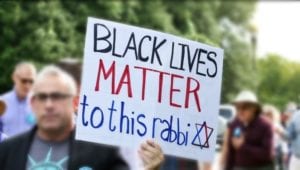
Support for Floyd
On June 2nd, the Jewish Council for Public Affairs (JCPA) released a statement of solidarity with the Black community “that has for far too long been targeted by police and have suffered rampant racism and unfair and uneven applications of the law.” The statement goes on to call for sweeping reform in policing and criminal justice.
The statement is undersigned by 130 Jewish organizations of every description. “Our faith drives us to be people who stand up for the morality of what’s right,” explained Eddie Chavez Calderon of Arizona Jews for Justice, adding, “the Jewish people know what it feels like to be marginalized and oppressed.”
But significantly, many of the 130 signatories (by our count, at least 98) apparently do not consider “justice and equality” a truly universal human right.
“No” to equality: ADL, JCRC ignore apartheid
For example, two dozen of the signatory organizations are branches of the Anti-Defamation League (ADL – $83 million in revenue in 2017), which actively and relentlessly advocates for Israel, has not endorsed Black Lives Matter because in 2016 that organization took a stand calling for justice for Palestinians. Yet ADL says of itself,
We are viewed as having unquestioned credibility because our actions draw from years of experience and are grounded in research and rigorous thinking.
Another umbrella organization with over 30 signatories on the solidarity letter is the Jewish Community Relations Council (JCRC – $2.7 million in revenue FYE 9/2018). JCRC branches are notorious for advocating for Israel and protesting when talks about Palestinian rights are presented.
In its brochure about its Israel advocacy, JCRC states:
JCRC values Israel’s integral role in the modern Jewish identity. We are committed to promoting a secure and vibrant Israel as the Jewish and democratic state and homeland of the Jewish people.
This statement is problematic on a number of grounds.
While Israel was founded as, and identifies as, “the Jewish State,” the implications of this title are formidable – as Palestinian academic and diplomat Sari Nussibieh points out. One-fifth of the population of Israel is non-Jewish, which makes them essentially strangers (if not unwelcome) in their own native land. (This is the remnant of the majority population that inhabited Palestine before they were pushed out to make way for the establishment of Israel.) Besides,
[R]ecognition of Israel as a “Jewish state” implies that Israel is, or should be, either a theocracy (if we take the word “Jewish” to apply to the religion of Judaism) or an apartheid state (if we take the word “Jewish” to apply to the ethnicity of Jews), or both, and in all of these cases, Israel is then no longer a democracy.
While Jews around the world are granted an automatic “right of return” to land some of their ancestors may have inhabited 2,000 years before, Palestinian Muslim and Christian families who were forced out of their ancestral homes in 1948 are denied the right to return because they’re not Jewish.
While Palestinians living in Israel are allowed to vote (under restrictive conditions, and while experiencing pervasive discrimination), millions living in Gaza and the West Bank are not able to participate in the selection of the government that essentially controls their lives under occupation.
“Apartheid”
British journalist Jonathan Cook, who lives in Israel, points out:
The discrimination faced by Palestinians in Israel is not illegal, informal, unofficial, or improvised. It is systematic, institutional, structural and extensively codified, satisfying very precisely the definition of apartheid in international law and echoing the key features of South African apartheid.
Other experts – including the United Nations – have reached the same conclusion: Israel is not a democracy, but an apartheid state.
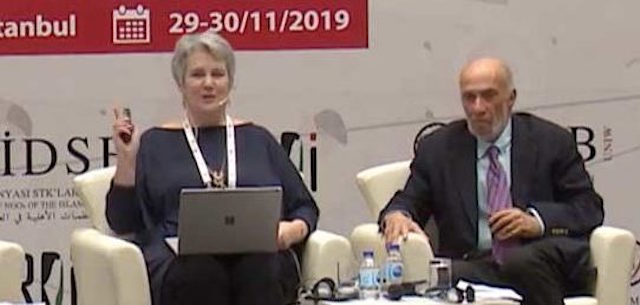
A few telltale signs of apartheid: Israel has about 70 laws that discriminate against the Palestinian minority; Israeli-run checkpoints limit Palestinian freedom of movement; Israel imposes curfews, military raids, and collective punishment; and Palestinians live under Israeli military law. Equality does not exist in such an environment. (Read more about apartheid here.)
The “homeland of the Jewish people” is also – and far more tangibly – the homeland of the Palestinian people. Israeli Jews (many of whom are not religious) claim that passages in an ancient religious document – taken completely out of context – “prove” their connection to the land. Meanwhile, Palestinians in many cases have land deeds, historical records, maps, and even house keys. Archives are full of photographs of Palestinians in the 530 or so towns and villages that were destroyed when the Israeli state was created.
(And, regarding religious connection, it may be relevant to note that the region is deeply holy to Muslims and Christians: Christianity was born in Palestine; Jerusalem is one of Islam’s most sacred sites; and Moses, Jesus, and Mary are revered by Muslims.)
As for the issue of “Israel’s integral role in the modern Jewish identity,” the American Jewish Committee found in 2019 that only 62% of US Jews say that “caring about Israel is a very important part of my being a Jew” (down from 70% as recently as 2018).
“No” to equality: Federations forget displacement of Palestinians
Also among the signatories to the George Floyd statement were a number of Jewish Federations around the country. Their umbrella organization, Jewish Federations of North America (JFNA – with revenue in 2018 of $263 million), also condemned the police action and claimed to oppose racism.
JFNA, which represents several hundred local Jewish groups and communities and raises over $3 billion a year, issued a statement declaring that it was “outraged and sickened by the violence of the Minneapolis police officers that led to the death of George Floyd.”
But while it vows to “fight for a world free of racism and bigotry in all of its forms,” it simultaneously boasts of its “unwavering,” seventy-year commitment to Israel – the same Israel that has killed over 10,000 Palestinians since 2000, over 20% of them children.
“Immigration”
According to its website, JFNA “has helped millions of immigrants move to Israel and start new lives” (see above for how this affects Palestinians). This endeavor is based on the Israeli “Law of Return.” The Jewish Agency explains:
With the inception of the State of Israel, two thousand years of wandering were officially over. Since then, Jews have been entitled to simply show up and request to be Israeli citizens…Essentially, all Jews everywhere are Israeli citizens by right.
JFNA also supports Israel through the Ethiopian National Project, an effort to assist with settling Ethiopian immigrants, and helping “thousands of Ethiopian-Israeli students achieve the Israeli dream.”
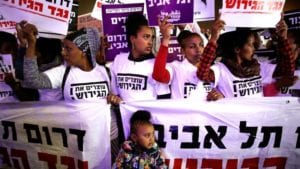
But for many immigrants of color, the “Israeli dream” is a nightmare. In early 2018, most of the estimated 38,000 Eritrean, Sudanese, and Ethiopian “infiltrators” (refugees and asylum seekers) in Israel were slated for deportation – the Justice Minister explaining on Facebook, “Israel is too small and has its own problems. It cannot serve as the employment agency for the African continent.”
However, according to Israel’s Central Bureau of Statistics, over 1.5 million Russians – a huge percentage of them not even Jewish – as well as 750,000 Jews from other European countries, have successfully emigrated to Israel.
The Israeli so-called Law of Return is deeply problematic – and not just in its discriminatory application. While it welcomes (at least in theory) anyone Jewish, however feeble their connection to the land – and considers them “returnees” – it bars the return of Palestinian exiles who seek an authentic and literal return to their families’ land. These refugees have been away from their homes, in most cases, for less than 75 years.
The Israeli policy renders invisible the 750,000 Palestinians displaced from their ancestral homes in 1948 in order to create the State of Israel, and the millions that now live destitute in refugee camps.
“No” to equality: B’nai B’rith promotes selective tolerance
B’nai B’rith ($8 million revenue in 2018) calls itself “the global voice of the Jewish community,” and claims to work for the advancement of human rights, tolerance, and peace around the world. The organization released a statement in the wake of George Floyd’s death, including:
B’nai B’rith cherishes the right to assembly, one of the cornerstones of the First Amendment of the U.S. Constitution, and respects the legal right of protesters to honor the memory of Mr. Floyd and to call out the injustices by Minneapolis police.
However, the organization has taken the opposite stand regarding Palestinians’ right to protest the injustices of Israeli policies. B’nai B’rith contradicts both its own viewpoint and that of the George Floyd solidarity statement, which declares, “Protests are a just response to all-too-familiar anger, frustration, and pain” (emphasis added).
Peaceful protest
In 2018, Gazan Palestinians began to hold weekly demonstrations (read about them here and here and see a video here) to call attention to their anger, frustration, and pain at Israel’s 12-year blockade of the Gaza Strip – a closure that has left its 1.8 million inhabitants without enough food, medicine, and other necessities. (Learn more about the blockade here.)
Israel responded to the peaceful protests with sniper fire and massive amounts of tear gas. (Learn more about the snipers here and here.) The brutality was shocking enough that the UN Human Rights Council called for an investigation.
The UN report revealed that over 6,000 unarmed Palestinians demonstrators were shot by Israeli military snipers (thousands more suffered from tear gas inhalation). 189 Palestinians – 35 of them children – were killed (since the end of the 2018 reporting period, at least 25 more have been killed):
The Commission found reasonable grounds to believe that Israeli snipers shot at journalists, health workers, children and persons with disabilities, knowing they were clearly recognizable as such.
During the protests, 4 Israeli soldiers were injured (one was killed on a protest day, but not in connection with the protests).
The UN Commission concluded there were
reasonable grounds to believe that during the Great March of Return, Israeli soldiers committed violations of international human rights and humanitarian law. Some of those violations may constitute war crimes or crimes against humanity…
It screened a video of the fatal shootings:
data:image/gif;base64,R0lGODlhAQABAAAAACH5BAEKAAEALAAAAAABAAEAAAICTAEAOw==
Villifying the UN and ICC
B’nai B’rith, which claims to “cherish the right to assembly…and respect the legal right of protesters,” rejected the clear, factual UN report outright, calling it an “anti-Israel UN ‘probe’” that had set out to “defame” Israel, and stating that “the U.N. Human Rights Council report should be denounced globally as the farce that it is.”
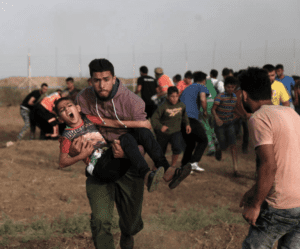
B’nai B’rith went on in its rebuttal to make unsubstantiated claims contradicting the valid findings of the report – for example declaring that Palestinian snipers targeted Israeli soldiers, and the Palestinian “children” killed were actually “marauding young men.”
Elsewhere, the organization ridiculed another global justice body, the International Criminal Court (ICC), declaring that its chief prosecutor, Fatou Bensouda, “cannot tell the difference between war crimes and Palestinian propaganda,” once again making claims that contradicted the facts.
B’nai B’rith’s mission of “making the world a safer, more tolerant and better place” appears to have some exceptions.
(The World Jewish Congress, which also misrepresents the protests in Gaza, released a statement about the death of George Floyd, including the words, “the answer to racism and bigotry must never be rampant violence. I join leaders on all sides of the political spectrum in calling for calm.”)
“No” to protest: Conservative and Reform groups demonize the oppressed
The Rabbinical Assembly (RA), an international association made up of about 1,600 (statistic from 2010) Conservative rabbis, pledged in its George Floyd statement,
United in purpose, we will dismantle the systemic racism all too embedded still within American law enforcement and its justice system…We must forever strive for a free and just society for all people.
But once again, there is a disconnect. RA was also a signatory to a statement in May 2019 responding to a particularly violent weekend in which rockets from Gaza had killed 4 Israelis; Israeli airstrikes killed 22 Palestinians.
The Rabbinical Assembly viewed the incident much as mainstream media often does. The New York Times had reported, “The outbreak of violence appears to have begun on Friday, when a [Palestinian] sniper wounded two Israeli soldiers.”
In reality, the “outbreak of violence” did not begin with a Gazan sniper. It followed more than a year of nonviolent protest (see above) that had resulted in over 200 Palestinian deaths and 1 Israeli military death. The protest followed 12 years of Israeli blockade and frequent airstrikes. Before that were 38 years of occupation. The Palestinians had been exiled from their homes and their land 20 years before that.
This is the context that the Rabbinical Assembly left out of its May 2019 statement, which read in part,
We mourn the deaths of four Israeli civilians killed by Hamas rockets. We extend our sincerest condolences to their families and pray for the full and speedy recovery of those who are wounded.
The Union for Reform Judaism (URJ) issued a similar statement in November 2019, during another “escalation.” This time, Israel had assassinated a Palestinian military leader; militants in Gaza had responded by firing rockets which had killed no one; Israel carried out ground and air attacks, indiscriminately killing 36 Palestinians.
This context, ignored by URJ, changes the entire substance of the incident. The statement reads in part:
The Union for Reform Judaism deplores the massive, ongoing rocket attacks unleashed by Islamic Jihad upon Israeli communities throughout the South of the country and the area around Gaza.
We stand in solidarity with the Israeli victims of this new round of violence. We pray for the healing of the injured and for the safety of the Israel Defense Forces as they combat this assault on Israeli sovereignty and security…
We remain in solidarity with the State of Israel and all Israelis even as we pray for Israel’s safety and security, for an end to this tragic violence, and for a future of real, lasting, and sustainable peace for Israel and for the Palestinian people.
While the groups claim that Israel is merely defending itself from Gaza rockets, the fact is that Palestinian rockets came after Israeli violence, and have killed a total of 30 Israelis in all the years they’ve been used, while Israeli air strikes have killed over 4,000 Gazans.
The possibility of real, lasting, and sustainable peace seems remote when the oppression of Gaza is unacknowledged.
No to human rights: American Jewish World Service looks the other way
American Jewish World Service (AJWS – $39 million revenue in FYE 4/19) is another signatory to the George Floyd statement. AJWS claims to advocate for universal human rights, specifically: participation in the political process that affects one’s daily life, free expression without censorship, peaceful pursuit of social change, and a life free from violence.
AJWS points out:
Although many countries have ratified an international covenant that safeguards basic human rights…governments often stray from their pledges and…get away with shocking abuses.

Israel ratified the UN Convention on the Rights of the Child, the 1966 Covenant on Civil and Political Rights, and the 1966 Covenant on Economic and Social Rights – yet it regularly detains and incarcerates children, keeps 5 million Palestinians in the occupied Territories permanently disenfranchised, while controlling every aspect of their lives; and withholds the means to an adequate education and standard of living, and freedom from violence and fear.
Israel and Palestine have a deep need for the kind of assistance AJWS offers – but AJWS, like many others, does not engage.
Some Jewish organizations that signed the JCPA solidarity statement with America’s Black community have a more realistic picture of Israel’s treatment of Palestinians – and/or a willingness to acknowledge Israel’s faults. They display a willingness to at least give lip service to the idea of social justice for Palestinians.
Reconstructionists on the right track
The Reconstructionist Rabbinical Association (RRA) is a professional association of over 300 Reconstructionist rabbis.
Reconstructionist Judaism is a modern, progressive form of Judaism that seeks to continuously reinterpret Jewish laws and traditions to mesh with contemporary life. Its official website includes position statements on dozens of topics – including Israel and Palestine. This branch of Judaism is not afraid to stand apart from the crowd of perpetually uncritical supporters of Israel.
A few examples:
RRA voiced its support for H.R.2407, Promoting Human Rights for Palestinian Children (read about this legislation here).
RRA criticized the “Deal of the Century” – the Trump Peace Plan (read a critique of it here) – which was created without Palestinian input; does not include a hoped-for “end to Israel’s role as an occupying power”; and would result in a Palestinian state “in a Swiss cheese-like territory…dotted by Israeli settlements.”
Many pro-Israel organizations have balked at the very idea that Palestinian children deserve protection from the Israeli military; RRA’s position on H.R.2407 is a welcome surprise to those seeking justice and equality for Palestinians.
Some pro-Israel groups have weighed in on the Trump Peace Plan – for example, B’nai B’rith loves it, ADL gives it a mixed review – but few have looked at it with any regard for the Palestinian perspective, as RRA has.
National Council of Jewish Women – a courageous stand
The National Council of Jewish Women (NCJW) defines its mission as “striv[ing] for social justice by improving the quality of life for women, children, and families, and by safeguarding individual rights and freedoms.”
While the group advocates for Israel, NCJW also consistently shows some comprehension of the Palestinian experience of injustice and oppression by Israel – and the courage to speak out.
For example, in May, 2018, the organization spoke out about the massacre of Gazan Palestinians by Israeli snipers. On May 14th, Israel had shot and killed 58 nonviolent protesters. Instead of creating a narrative of Israeli innocence (like ADL, JCRC, and JFNA), NCJW asked whether the Israeli military could have used less violent methods, and why the Israeli government was not “dedicating itself full-time” to genuine peace negotiations.
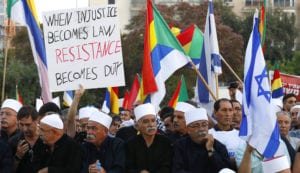
Elsewhere, NCJW lived up to its mission when it commented on a piece of legislation that had just passed the Israeli Knesset – a bill (now law) specifying that Israel is the historical and national homeland of the Jewish people, that only the Jews have “national self-determination” in Israel, that its official language is Hebrew, and that Israeli settlements – illegally built on Palestinian land – are a “national value.”
Each clause in the Nation-State Law is an affront to the Palestinians living Israel – who have lived there for generations longer than most Jewish Israelis. The law serves to codify unjust practices, making equality more out of reach than ever for Palestinians.
In a statement called “Israel’s Jewish nation state law an affront to human dignity and decency,” the National Council of Jewish Women declared,
This bill takes away hope of creating an equal and shared society. It favors one group’s ability to build communities over another’s, and it diminishes the historic status of the Arabic language as one of the two official languages of Israel…
We are dismayed and disgusted by this new law which opens the door wider to legal discrimination.
Nearly every organization’s website alludes to the “Jewish values” of justice (as expressed in Deuteronomy 16:18: “Justice, justice shall you pursue”) and “tikkun olam,” the Hebrew expression for repairing the world.
While NCJW considers its members “staunch supporters of Israel,” does not acknowledge Israel’s establishment through ethnic cleansing, does not seem to acknowledge Palestinians’ right of return, and does not prioritize justice for Palestinians, it is one of the few groups that doesn’t completely abandon its values when it comes to Palestinians.
(Besides RRA and NCJW, the New Israel Fund (NIF) walks the fine line of being pro-Israel and working for Palestinian rights. NIF speaks out against settlements, the Nation State Law, and the right to boycott Israel – although the organization itself does not participate in BDS. NIF’s statement about racial justice therefore has some credibility.)
No doubt every one of the 130 signatories to the statement of solidarity is sincere: each organization hopes for peace and believes in justice and equality for Black Americans. It is puzzling that so few are committed to these ideals in Israel – a place desperately in need of repair.
Unlike the mainstream groups, many Jewish individuals support Palestinian rights:
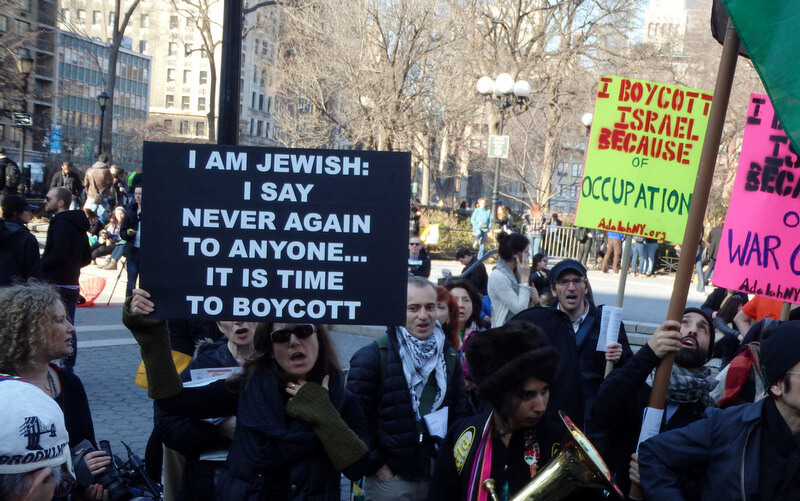
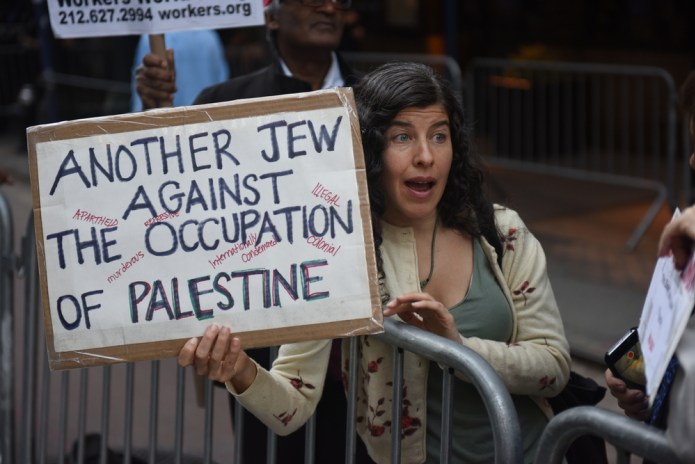
Kathryn Shihadah is staff writer for If Americans Knew. She blogs at Palestine Home. This article was originally published in 2020. We’re re-posting it today in honor of Martin Luther King.
Our operations are funded solely by generous individuals like you. Your contribution will help us continue shining a light on the Israel/Palestine situation and the U.S. connection.DONATE
RELATED READING:
Speakers oppose racism in the U.S. while supporting it in Israel
While US is in crisis, Congress posts 68 bills (and counting) for Israel
Israeli mistreatment of Palestinian children
Human rights reports on Israel-Palestine (regularly updated)
American Zionists choose lies over children
Anti-Semitism Envoy Elan Carr puts Israel (not Jews) front and center
95% of Congress is ok with Israel’s torture of Palestinian children



